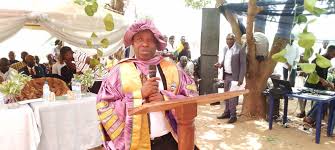
A discussion forum on democracy and good governance has called on the political class, especially the National Assembly, to work towards amending the constitution in a manner that ensures the inclusion of monarchs in peace-building processes and the nation’s governance structure to help democracy grow in the country.
Speakers at the interactive assembly reviewed the excellent previous roles of traditional rulers in promoting peace in the country and canvassed for the royal o9il0fathers to be returned to the mainstream of national affairs to enable them actively contribute their quotas in the efforts to tackle insecurity and ensure the stability of our democracy and political structures.
The event was the 13th Round Table discussion on the growth of politics and governance in the nation organised by the Department of Political Science and International Relations, the University of Abuja, with the theme “Promoting peace through traditional authorities, citizens consultation and participation in Nigeria.”
The event was held with support from Rosa Roxenberg Foundation of west Africa.
Lead speaker, Prof. Iro Iro Uke, in his paper, called for the reversal of the injustice that was done to monarchs when they were made ceremonial figures without defined roles in the constitution.
He argued that traditional rulers will perform better when they are insulated from political influence and barred from partisanship but made custodians of peace in their communities.
Prof. Uke recalled that Nigeria has gone through four republics and added that throughout the journey, there have been breaches of peace here and there.
“In the first republic, breaches of peace occurred a few years after political independence. Such crises included the 1962/63 Census crisis, the Action Group crisis of 1962, the federal election crisis and the western election crisis of 1965.
“The problem with the politics of the Fourth Republic appears to be the political class itself. They have turned out to be what can safely be described as Nigeria’s natural disaster.
“The crises today were further reinforced, by a system-destroying elite attitudinal pattern which predisposed political actors to a systematic violation of institutional procedures and which turned political competition into an intensely combative and perilous display of brinkmanship.”
Another speaker, Associate Professor Mutiullah A. Olasupo, who is the Director, Sultan Maccido Institute for Peace, Leadership and Development Studies also supported the contention that monarchs should be given defined roles as peacemakers in the constitution.
“Since 1999, the nation has witnessed serious security challenges that have not only threatened her existence as a nation but have defied all solutions for its eradication including the efforts of the security agencies to tackle the problem.
“This calls for urgent attention and collaboration of traditional rulers in checking the rising tide of insecurity. Monarchs are rulers of communities and the custodian of people’s culture.
“Monarchs have a grip of the people at the grassroots and therefore can mobilise people for action against insecurity in their domain and by extension the nation.”
Prof. Mutiullah Olasupo, recommended that traditional rulers should seen, across the country, as the custodians of our culture who are expected to be neutral father figures in their respective domains by not taking sides in contestable matters, such as politics or lawsuits.
“Traditional rulers should also expand the medium of citizen’s consultation and involvement in conflict resolution within their jurisdiction,” he said.
In a brief remark, program manager of Rosa Roxenberg Foundation, Mrs. Angela Odah urged Nigerian leaders to shift their perception on security policies by allowing traditional rulers to play more active roles in maintaining peace in their respective domains.
She also said that the nation requires a proper change in the manner politics is practiced in the country to ensure the proper inclusiveness of women and youth in the political and governance structures.
Mrs. Angela Odah also explained in a brief interview that monarchs were not invited to the event, evenof democracy and the quest for peace in Nigeria.
Former Dean of the Faculty of Social Science, Prof. Yusufu Alli Zoaka, defined elites as any educated person who has acquired western education and he appealed to the audience made up mainly of students not to allow their education to mislead them into becoming corrupt members of the elite.




